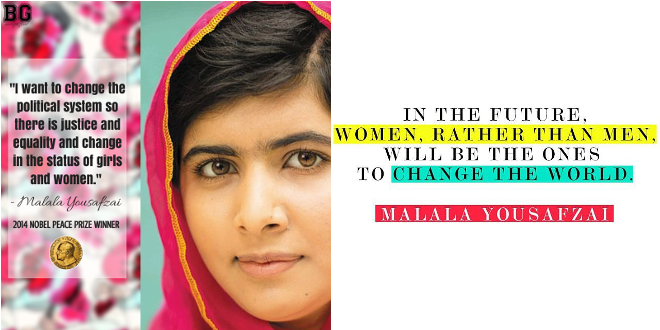
I will be the first one to admit, I take my education for granted sometimes. I can’t count the number of times I have sat in school, annoyed; wondering when I can break free and do something fun. I would do anything but school. There have been so many instances where I would be too distracted to study for my exams, and wanted to give up on my career because I was unmotivated to take the next big step. Looking back on those moments, I feel silly. Not only do those reasons seem petty now, I also feel ashamed admitting these feelings.
But the youngest Nobel Peace Prize laureate in history, Malala Yousafzai, also the recipient of the World’s Children’s Prize as of Tuesday, helped me re-discover my love for education. In 2012, Yousafzai, 17, was shot in the head by the Taliban near her home in Pakistan because her outspoken advocacy of girl’s right to education.
After hearing her story of bravery, I was inspired to excel in my field, so that one day I can be in a place that enables me to help and inspire other women, who may not have the same luxury to school that I have.
It took a 17-year-old girl to take a stance against the Taliban, and risk her life for the love of education for the world to wake up and understand the crisis at hand. Yousafzai’s story is not just an inspirational anecdote repeated to remind ourselves why we should wholeheartedly pursue our studies, her story points to an impending issue that plagues the world. This holds especially true for the South Asian and Middle Eastern female population.
Coming from Pakistani descent and moving to America at the age of one, first world problems kept me too occupied to see how the other half-lives. I threw away my coloring books, gave away my class notes, disregarded text books in favor of my Facebook newsfeed and rushed through homework to watch ABC’s “Scandal,” but to think, there is one girl who would die to live in my shoes.
In Pakistan alone, only 40 percent of women over the age of 15 can read and write. That number drops even lower in rural parts of the country, where women are most vulnerable and most likely be oppressed. To put that into perspective, out of the 78 million women and girls in Pakistan, roughly 47 million cannot read and write. In Bangladesh the situation is even worse; out of the 81 million women and girls in the country, roughly 12 million are educated.
With such low literacy rates for women, it is important to understand why education is important and why Yousafzai felt so strong about attending school. Children of mothers with secondary education or higher are twice as likely to survive beyond the age of five as compared to those mothers who have no education. A child born to a mother who can read is 50 percent more likely to survive past the age of five. Each additional year of schooling beyond primary offers greater payoffs for improved opportunities, options and outcomes for girls and women.
The challenges to attain equal education for women continue to plague society worldwide. No nation can possibly succeed when half of its population is left back. In regions like Balochistan, a southwestern province in Pakistan, for any girl working towards an education can be an issue of life or death. Not only do women in the region have difficulty accessing an education, schools are routinely shut down by terror groups that advocate for female education.
The situation in Afghanistan appears to be just as bleak with 85 percent of women lacking a formal education.
With statistics like these, those of us who are able to read this article, access the Internet, provoke conversation and inspire action, need to remain passionate about women’s rights when it comes to attaining an education. An educated female population in most cases can be the single most important factor in lowering infancy rates. It is directly correlated with increased prosperity, agriculture, lower mortality and poverty rates.
We need to use Yousafzai’s story as a constant reminder for why we need to help those who do not share the same privileges as us. Whether it is keeping up to date with the latest on child education, supporting charities such as the Malala Fund or sending money overseas to pay for a child to attend school, are all actions that can positively bridge the education gap in many impoverished countries. Heck, sharing our story will encourage even more person to take action!
The next time someone asks for donations to help a child attend school, remember, your contribution can be the difference between that child’s life and death.
As Yousafzai once said:
One child, one teacher, one book and one pen can change the world. Education is the only solution. Education first.”
[divider]
Mahrukh Zaidi, a native Long Islander and a serious coffee addict, is a healthcare administrative fellow by profession. When she isn’t busy trying to solve the latest issues in healthcare, she is shopping her life away. She is a serial shopper with an addiction for the latest beauty trends. During her down-time, you can find her at the nearest Starbucks, enjoying a nice book or catching up on the latest current events and politics.




